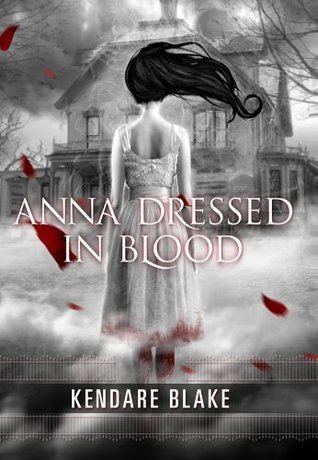If there's one thing that many aspiring writers have few clues about, it's the submission process. There are good reasons for that; authors aren't exactly encouraged to talk in detail about our own submission experiences, and - just like agent hunting - everyone's story is different. I managed to cobble together a few non-specific questions that some debut authors have agreed to answer (bless them). And so I bring you the submission interview series - Submission Hell - It's True. Yes, it's the SHIT.
Todays guest is my agency sister - Kendare Blake! Kendare (like me) is represented by Adrianna Ranta of Wolf Literary. Her book, ANNA DRESSED IN BLOOD features Cas Lowood a teen who has inherited an unusual vocation: He kills the dead. Cas travels the country with his kitchen-witch mother and their spirit-sniffing cat. Together they follow legends and local lore, trying to keep up with the murderous dead. When they arrive in a new town in search of a ghost the locals call Anna Dressed in Blood, Cas doesn't expect anything outside of the ordinary: track, hunt, kill. What he finds instead is a girl entangled in curses and rage, a ghost like he's never faced before. She still wears the dress she wore on the day of her brutal murder in 1958: once white, now stained red and dripping with blood. Since her death, Anna has killed any and every person who has dared to step into the deserted Victorian she used to call home. But she, for whatever reason, spares Cas's life.
How much did you know about the submission process before you were out on subs yourself?
I knew a lot, and a little. I’d been out after agents for what seemed like forever, and I’d also been on sub to editors with my small press novel, SLEEPWALK SOCIETY, so I had an inkling what I was in for. But it wasn’t until I was on sub with ANNA that I started hanging out in the editor submission boards and really blog-stalking submission posts.
Did anything about the process surprise you?
It surprised me just how many people are involved in the process. It makes sense and everything, but at the start you still have this vision in your head of an editor in a three-piece chewing a cigar, reading and saying something like, “hot dog!” and getting right on the phone to your agent. But there are committees. And meetings. And sometimes more committees and more meetings.
Did you research the editors you knew had your ms? Do you recommend doing that?
Oh I stalked like mad. As much as was legal. I was the silent shadow. In fact, I really challenge anyone out on sub to restrain themselves from taking even a tiny peek. It’s not a bad idea, after all. It can give you an idea about what kind of books they like, make you even more excited to work with them. But it’s an individual choice.
What was the average amount of time it took to hear back from editors?
Gad, I think I’ve blocked this out. It feels like it all happened in no time, but I think it was at least a month before we started getting interest and then another few weeks of the manuscript being in meetings and such.
What do you think is the best way for an author out on submission to deal with the anxiety?
The best way? I don’t even know of A way. But hanging with friends doesn’t hurt. Talking about it moderately and then shoving it completely into a dark corner! I made ridiculous bargains with myself. I said if the book sold, then I had to do something that I really didn’t want to do. That way, if the book didn’t sell, I could say, “well, at least I don’t have to do that really unpleasant thing.” But that wouldn’t have eased the blow. Not really. I hear booze and chocolate helps, if you’re of age.
If you had any rejections, how did you deal with that emotionally? How did this kind of rejection compare to query rejections?
I’d gotten used to query rejections, so editorial rejections hurt worse at that point. Like the query rejections hurt at the start. There was a definite feeling of, “I’m going to get just this close, and no closer. Not ever. I’m such a raging loser! What do I have to do? Curses! Why, god?! WHY?!!” Okay, not so dramatic as the end there.
But rejections always suck. No matter what stage of the game you’re at. I’m sure I’m going to get a lot more rejections, on a lot more projects. And they’ll all suck just as bad as the first. If not worse. Ah yes, the SHIT doesn’t go away.
If you got feedback on a rejection, how did you process it? How do you compare processing an editor’s feedback as compared to a beta reader’s?
We waited to see if the feedback was consistent. If it was, we’d consider revising. But as it happened, it really wasn’t, so I got to skirt that part. Didn’t process it at all.
When you got your YES! how did that feel? How did you find out – email, telephone, smoke signal?
If only Adriann would communicate via smoke signal. We should ask her. But no, she called, and it was…great. Amazing. All the yay words in the world don’t describe it. It lasted about an hour before the worry set in. But then it came back several times after that.
Did you have to wait a period of time before sharing your big news, because of details being ironed out? Was that difficult?
I didn’t have to wait. But I can’t imagine those who have to. That would be hard! But, sort of a giddy, wonderful kind of hard.



